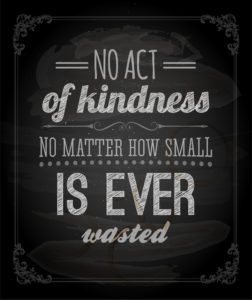One of the top New Year Resolutions that you can make to improve your health would be acts of kindness.
Random acts of kindness have become a hot topic in science and psychology today. And the reason why is that there are multiple studies that demonstrate how compassionate giving and benevolence improve the health of both the giver and the receiver.
To help you understand how acts of kindness can improve your health let’s break this down into two categories. Here’s the first:
Acts of Kindness – Physiological Effects
Here’s a list of the physiological benefits that your body will derive when you engage in acts of kindness. When you see this list, I hope it encourages you to make it a daily goal to engage in a random act of kindness for both you and the receiver. Both will enjoy health benefits.
Serotonin – As you engage in acts of kindness your brain responds by increasing its production of serotonin. Serotonin helps in wound healing, clams you down, and makes you happy.
Endorphins – This is the body’s natural pain killer, which has been show to be 3 times more effective than morphin.
Oxytocin – Often called “the cuddle hormone” because it promotes social bonding. But it goes beyond just that. This hormone also has a calming effect, helps to increase trust, can strengthen the immune system, and can boost virility.
DHEA – While there is still a lot that we don’t know about this hormone we do know this. It’s the precursor to the male and female sex hormone, which decreases after the age of 30. For those who engage in random acts of kindness, their levels of DHEA are 2x the normal amount. This has both an anti-aging benefit as well as a sexual function benefit.
Cortisol – This is the stress hormone, which can be a two-edge sword. On the one side you need this hormone to help regulate your metabolism and immune response. On the other side when you have to much in your system it can interfere with sleep and the body’s natural ability to restore itself. This can lead to stress related illnesses. For those that engage in acts of kindness they have 23% less cortisol, which helps them better balance this hormone in their system.
When you combine all of the above, this results in improved cognitive function, increased energy, lower heart rate, less internal stress, a strengthened immune system, and the potential for a longer and more satisfying life.
Click here for a short but excellent video that recaps these benefits.
Acts of Kindness – Psychology Effects
These are more subjective but they are real. We feel happier when we engage in acts of kindness. This usually improves our sense of well-being and stimulates friendship. It increases our compassion for others, which can then also reduce bullying.
Many studies have shown an improvement in mental health. Both for the giver and the receiver. It also stimulates the feeling of love for others, which can positively influence social networks. Especially if these random acts of kindness are paid forward.
And those who engage in this practice of helping others are usually more successful in life.
To help you understand this social benefit here’s a great video from a TED Talk. It is Orly Wahba of LifeVestInside and how she has made random acts of kindness into a positive movement that benefits both children and adults.
I’m sharing it with you as an act of kindness because some of the examples she highlights will bring a tear to your eye and show you the power of what it can to for you and the receiver.
Like any good health pathway you must make it a habit.
A daily routine that provides you with a health benefit. Here’s the nice thing about random acts of kindness. There is no downside to it. Only potential health benefits for you and those you touch. Who in turn touch the lives of others. Leading to a physically, mentally, and socially healthier world.
Leave a Reply
You must be logged in to post a comment.